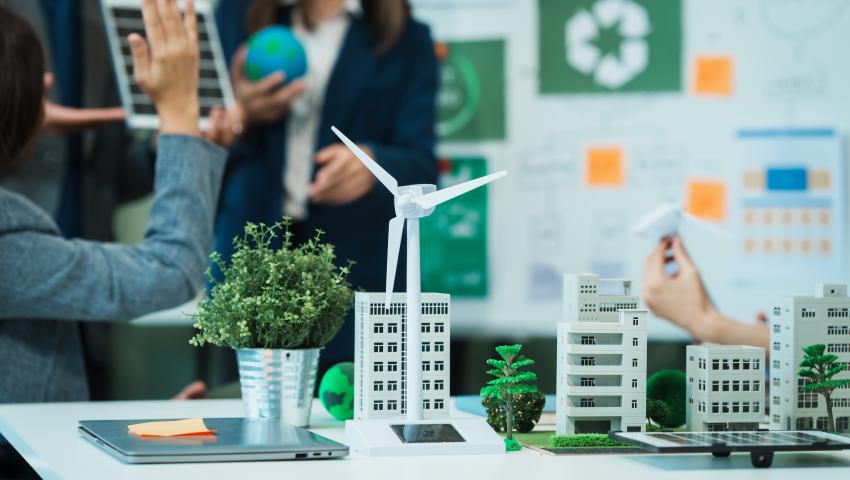
Building a Sustainable Business: Environmental and Social Responsibility
In today’s rapidly evolving world, businesses face growing pressure to adopt sustainable practices that not only drive profitability but also support the environment and society.
The concept of sustainability has shifted from being a trend to becoming a core component of business strategy. This article explores how businesses can build a sustainable future by prioritizing environmental and social responsibility.
Why Sustainability Matters in Business
Sustainability, at its core, is about meeting the needs of the present without compromising the ability of future generations to meet their own. Businesses that embrace sustainability are better positioned for long-term success. Here’s why:
- Consumer Expectations: Modern consumers are more socially conscious than ever before. They are actively seeking out businesses that demonstrate genuine commitment to the environment and social causes. Brands that align with these values foster stronger relationships and customer loyalty.
- Regulatory Compliance: Governments around the world are tightening regulations related to environmental impact and labor practices. Businesses that take a proactive approach to sustainability can avoid penalties, fines, and legal complications while positioning themselves as industry leaders.
- Operational Efficiency: Sustainable practices often lead to cost savings through reduced waste, energy efficiency, and streamlined processes. A focus on sustainability is not just good for the planet but also for the bottom line.
- Attracting and Retaining Talent: Employees, especially millennials and Gen Z, prefer to work for organizations that are socially responsible. A strong sustainability program enhances employee satisfaction and helps attract top talent.
Environmental Responsibility: Reducing Your Footprint
Environmental responsibility involves minimizing the negative impact your business has on the planet. Here are some steps businesses can take to improve their environmental performance:
1. Energy Efficiency
Reducing energy consumption is one of the most effective ways businesses can lower their environmental impact. Simple changes such as switching to LED lighting, optimizing heating and cooling systems, and investing in energy-efficient machinery can significantly reduce a company’s carbon footprint.
2. Sustainable Sourcing
Ensure that the raw materials and products your business uses come from sustainable sources. This could mean working with suppliers who practice ethical sourcing, use renewable resources, or minimize environmental harm in their production processes. Additionally, adopting circular economy practices by recycling and reusing materials can help further reduce environmental damage.
3. Waste Management
Effective waste management can reduce the amount of material that ends up in landfills. Businesses can implement strategies such as reducing packaging, encouraging recycling, and composting organic waste. Partnering with waste reduction programs or zero-waste initiatives can also create a positive impact.
4. Water Conservation
Water is a precious resource, and many businesses consume large quantities of it in their operations. Implementing water-saving technologies, fixing leaks, and recycling wastewater can help reduce the demand on local water supplies and promote long-term sustainability.
5. Carbon Offsetting
While it’s not always possible to completely eliminate a business’s carbon footprint, many companies are investing in carbon offset programs. These programs allow businesses to contribute to projects that reduce carbon emissions, such as reforestation or renewable energy initiatives, to counterbalance their environmental impact.
Social Responsibility: Supporting People and Communities
Social responsibility focuses on the human aspect of sustainability—how businesses can improve the lives of individuals and communities. This involves creating ethical labor practices, supporting social causes, and fostering a positive company culture.
1. Fair Labor Practices
A sustainable business prioritizes fair and ethical treatment of its workers. This includes providing safe working conditions, offering fair wages, and ensuring that employees have access to health and wellness programs. Companies should also consider their supply chain partners and ensure that they adhere to similar ethical standards.
2. Community Engagement
Businesses are integral parts of the communities in which they operate. Social responsibility includes giving back to these communities through philanthropy, volunteer work, and support for local organizations. This fosters goodwill and builds strong relationships with stakeholders, while also helping address social challenges such as poverty, education, and health.
3. Diversity and Inclusion
Building a diverse and inclusive workforce is not just an ethical responsibility but also a strategic advantage. Businesses that embrace diversity benefit from a broader range of perspectives, which can lead to greater innovation and improved decision-making. By promoting an inclusive workplace culture, businesses can attract talent from all walks of life and create a positive working environment.
4. Ethical Supply Chains
In today’s interconnected world, businesses must consider the social impact of their supply chains. This involves ensuring that suppliers uphold ethical labor standards, provide fair wages, and avoid exploitative practices such as child labor. Partnering with suppliers who prioritize social responsibility enhances a company’s credibility and fosters trust among consumers.
5. Health and Safety
Businesses should take steps to ensure that their operations do not negatively impact the health and safety of their employees, customers, or the communities they serve. Implementing strong health and safety protocols, promoting mental wellness, and ensuring access to healthcare are critical components of social responsibility.
A Roadmap to Sustainability
Building a sustainable business requires a strategic approach that integrates environmental and social responsibility into every aspect of operations. Here are key steps businesses can take to start their sustainability journey:
- Assess Your Impact: Conduct an audit to identify the areas where your business has the most significant environmental and social impacts. This will provide a clear understanding of where improvements can be made.
- Set Clear Goals: Develop specific, measurable goals for reducing your environmental footprint and improving social outcomes. These could include targets for reducing energy consumption, increasing diversity, or sourcing materials sustainably.
- Engage Stakeholders: Involve employees, customers, and suppliers in your sustainability efforts. Foster a culture of sustainability within your organization by encouraging innovation and collaboration.
- Measure and Report Progress: Regularly monitor and report on your sustainability efforts. Transparency is essential to building trust with stakeholders, and regular reporting allows businesses to track their progress and adjust strategies as needed.
- Stay Informed: Sustainability is a constantly evolving field. Stay up to date with the latest trends, technologies, and regulations to ensure that your business remains at the forefront of sustainability efforts.
Conclusion
Building a sustainable business is no longer just a "nice to have"—it’s a necessity for long-term success. By adopting environmental and social responsibility as core pillars of your business strategy, you can reduce your impact on the planet, improve the well-being of your employees and communities, and position your company for future growth. Sustainability isn’t just about saving the planet; it’s about creating a better future for everyone.
